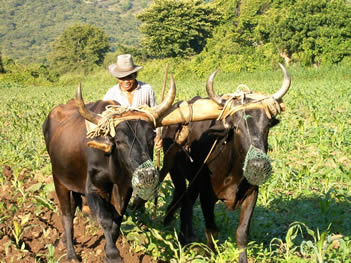Production Strategies
 Foraging: using only what is available "naturally" on the land.
Foraging: using only what is available "naturally" on the land.
Pastoralism: Depending primarily on herding.
Swidden: A type of gardening.
Traditional Ag: Stable fields with non-industrial methods.
Industrialized Ag: what we have now.
| Society |
Energy Efficiency |
Calories per person and year |
| Foraging |
11 out per 1 in |
670,000 |
| Swidden |
18 out per 1 in |
735,000 |
| Traditional Ag |
54 out per 1 in |
5,5 million |
| Industrial ag |
5,000 plus per 1 in |
Unknowable |
Stats for Pastoralism: about 6000 kcal/acre vs about 7,409,000 for wheat farming.
Next: Background to forager studies
You should understand that the numbers in these charts are representative only. How many calories people produce and consume vary enormously from society to society. And how many calories people need varies from person to person. Basil metabolism, the amount that average human bodies consume is generally taken to be about 1,500 calories per day or about 550,000 in a year. This is about the minimum people need just to stay alive. All successful societies must produce this much.
Of course, the more physical activity you do the more calories you need to sustain your body. Professional athletes often consume 5,000 to 12,000 calories a day, around 2 to 4 million calories per year. That means that today's professional athletes require amounts of food that were almost impossible to produce in most premodern societies.
When you think about this stuff, consider that the amount of food the average person eats may be a bit variable but has limits. Even an insanely athletic person can't consume more than about 12,000 calories in a day, and 3,000 a day is more than enough for all but the most athletic among us. So, if producers in a society are creating much more than that, where does it go and how does it get there? In all chiefdoms and state societies, at least some people live by consuming calories produced by others. The means of getting those calories away from those who produce them are very highly variable but often have entailed oppression.
Industrial agriculture really is an extraordinary thing that we should all take a moment to appreciate. It's a change so big that it is sometimes referred to as the second agricultural revolution (the first being the move to plant and animal domestication). We support more than 8 billion people and the problems of hunger we have are problems of economy and distribution, not failure of the world's agricultural systems to produce enough food. HOWEVER, the current system also imposes enormous costs and isn't sustainable, at least in its current form. One cost is in energy. Ours is the LEAST EFFICIENT system of production the world has ever known. Including all inputs (mechanical, electrical, fossil fuel, etc, etc) everything we eat costs us more calories to produce than we receive from it. We can only pursue this by tapping enormous quantities of non human energy. Whether or not that energy will always be available is anyone's guess. Beyond that, the pollution and environmental degradation caused by our current system exceeds anything the world has ever known. Other societies destroyed their environments; we're not the first. However, from top soil loss to seas of animal excrement, to islands of floating garbage, no society has ever degraded the environment on the scale we are currently doing. The toll on pretty much every aspect of the natural world has been devastating and easily visible to someone my age. The change and environmental degradation in the world since my childhood is truly extraordinary. Finally, the fat and sugar laden highly processed food that fills the diet of an increasingly large percentage of the world's population is literally killing us. The average American supermarket has about 39,000 different items on its shelves and the vast majority of them shouldn't be eaten by anyone. Health problems caused by obesity, diabetes, high blood pressure, kidney diseases, heart disease, etc etc have substantial roots in eating highly processed foods that are truly bad for you. This food is cheap and convenient and often people have little choice but to consume it. However, it exacts a heavy toll on physical and psychological health.
I'm not any kind of a "food nut." I'm not a vegetarian or an anything else-atarian. I have a pretty major sweet tooth. However, I urge you to really think about what you eat, both for your own health and for the health of the planet. Reduce your consumption of processed foods of all kinds, especially fast food. Try to move away from consuming beef and cheese (and sheep and goat products). Move away from soft drinks, energy drinks, and especially anything labeled "diet" anything. All of these things are OK from time to time but a constant diet of them is bad for both your health and the planet's.
 Foraging: using only what is available "naturally" on the land.
Foraging: using only what is available "naturally" on the land.